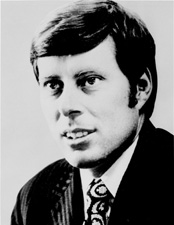- John V. Tunney
Infobox Senator | name=John Varick Tunney

jr/sr=United States Senator
state=California
party=Democratic
term_start=January 2 ,1971
term_end=January 1 ,1977
preceded=George Murphy
succeeded=S. I. Hayakawa
date of birth=birth date and age|1934|06|26
place of birth=New York City ,New York
dead=alive
date of death=
place of death=
spouse=
alma_mater=Hague Academy of International Law University of Virginia
religion=Roman Catholic
state2=California
district2=38th
term_start2=January 3 ,1965
term_end2=January 2 ,1971
preceded2=Patrick M. Martin
succeeded2=Victor Veysey John Varick Tunney (born
June 26 1934 ), was a Democratic Party United States Senator and Representative. He is the son of the famous heavyweight boxing championGene Tunney .Tunney graduated from
Yale University , where he was a member ofSt. Anthony Hall , in 1956. He attended theHague Academy of International Law in the Netherlands, in 1957, and graduated from theUniversity of Virginia law school, where he was a roommate of future Massachusetts senatorTed Kennedy , who remained a close friend. Tunney was admitted to theVirginia andNew York bars in 1959 and practiced law inNew York City .Tunney joined the
United States Air Force as a judge advocate and served until he was discharged as a captain in April 1963. He taught business law at theUniversity of California, Riverside in 1961 and 1962. In 1963 he was admitted to practice law inCalifornia . He was a special adviser to thePresident's Committee on Juvenile Delinquency and Youth Crime from 1963 until 1968.Tunney was elected as a Democrat to be the
California Representative of Riverside and Imperial Counties to the Eighty-ninth U.S. Congress and served fromJanuary 3 1965 until his resignation onJanuary 2 1971 .United States Senator
In one of the most bitter primary campaigns in California history, Tunney defeated fellow Congressman
George Brown , who represented a congressional district that bordered Tunney's district in the Riverside - San Bernardino area of California. One of the key issues was the draft; while Brown and Tunney both questioned the continuing and expanding U.S. involvement in Vietnam, Brown opposed continuing the military draft while Tunney favored it. This bitter primary allowed incumbent RepublicanGeorge Murphy to gain a lead in the early polls. However, Murphy was in his late 60s and his speaking voice was reduced to a gravel whipsper from throat cancer while Tunney was youthful and energetic, often displaying "Kennedyesque" traits on the campaign trail. California's growing population was becoming more liberal, and Murphy's staunch support for the Vietnam War also hurt his support. While Tunney favored keeping the draft, he questioned the continuing U.S. involvement in southeast Asia. As the general election approached, Tunney overtook Murphy in the polls and steadily built a lead. Ultimately, Californians split their ticket in the 1970 mid term election, easily reelecting Republican governorRonald Reagan and easily electing Democrat Tunney to the Senate.Tunney was elected in 1970 to the
United States Senate representing California for a single six-year term when he submitted theTunney Act in 1974. During this period, Senator Tunney produced a weekly radio report to California, in which he often interviewed other legislators.Tunney was renominated despite a high-profile challenge from the left in the form ofTom Hayden , but was defeated for re-election in 1976 byS. I. Hayakawa . Hayakawa, the President of San Francisco State University, was a moderate Republican who had never held elected office. He ran as an outsider, and highlighted Tunney's numerous travels, missed Senate votes, and poor Senate attendance record during the campaign. Still, Tunney led in the polls right up to election night, although his lead steadily shrunk as the campaign wore on. Despite Deomcrat Jimmy Carter's victory in the Presidential election, Tunney lost to Republican Hayakawa in a mild upset (it is noted that Republican Gerald Ford carried California in the Presidential election). Tunney resigned his Senate seat onJanuary 1 1977 , two days before his term was to officially expire to allow Hayakawa to have seniority over other incoming Senators.Tunney wrote a book, "
The Changing Dream ".After his defeat he played little role in politics, focusing instead on law practice and service on corporate boards. In February 2003, Tunney joined with other former Senators including
George McGovern andFred Harris in opposing a war withIraq .External links
* [http://www.tunney.org/ Former U.S. Senator John V. Tunney]
* [http://bioguide.congress.gov/scripts/biodisplay.pl?index=T000410 Biographical Directory of the United States Congress entry]
Wikimedia Foundation. 2010.
